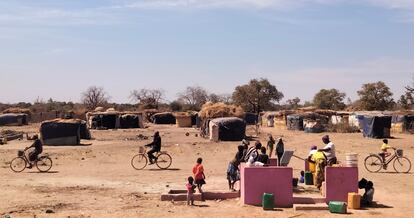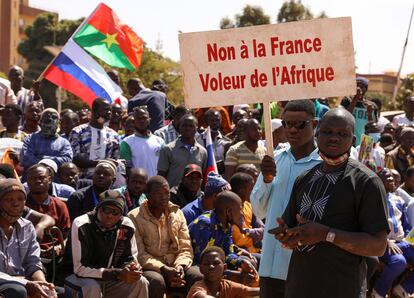Jihadist violence in the Sahel opens the door to Russian expansionism
Half of Burkina Faso is under terrorist control and its military regime has ordered the withdrawal of French troops, following the lead of Mali where Wagner mercenaries are operating


A walled plot of land in Bigtogo, on the outskirts of Ouagadougou, is home to 300 people. Some of the houses are made of plastic and straw, thrown together in a few days. The elderly or sick sleep in the old pigsty, where children seek the shady corners to do their school work. “We saved our lives, but we lost everything else,” says Rasmane Sawadogo, a 59-year-old trader. They call them “the displaced people” and in Burkina Faso they number about two million, around 10% of the entire population. More arrive every day and settle wherever they are allowed to. They are fleeing the jihadist groups that have plunged Burkina Faso and Mali into a chaos of violence, massacres, hunger and instability that is spreading across the Sahel region of Africa. And it is a war the jihadists are winning.
“The terrorists came to Pobé Mengao and shot 14 people,” says Bourema Konfé, “the rest of us escaped to Djibo. But we did not give up. We recruited a group of young men and returned to the village with our hunting shotguns. The government sent 15 soldiers to help us. Until one day, at 4am in the morning, those people came back. They had sophisticated weapons, they killed soldiers and civilians who tried to confront them and they destroyed everything, they set fire to the houses.” Mariam Ganamé, her husband and nine children also fled, leaving behind them unburied corpses.
Eight years ago, the jihadist threat was just a faraway rumble in the north of the country, seemingly another world from the capital, Ouagadougou. Today, 10 of Burkina Faso’s 13 regions are under constant siege and attacks. Hardly any of the main cities are considered safe, and traveling between them is already a risky undertaking. “The situation has been getting worse and more brutal for years, but it has intensified since November,” says the coordinator of a local NGO. That month, the Burkinabé Army launched a campaign to recruit 50,000 civilian militia, the so-called Volunteers for the Defense of the Homeland (VDP). “They have equipment problems but a strong will to cooperate with the state,” adds the same source.
In front of a barrier on one of Ouagadougou’s main avenues, a policeman stands guard with a grim look on his face. Behind him is the Crafts Fair, an international expo whose aim is to show the world that, despite everything, life goes on. The government has given workers a half day to make it easier for them to visit. A few meters away, human rights activist Daouda Diallo secures the padlock on the door of his office. “Two weeks ago, they almost kidnapped me; we are under threat and the situation is serious,” he says. The country is at war, and those voices who are critical of what is happening on the front lines are becoming increasingly uncomfortable.
The numbers speak for themselves. “Half of the country is under jihadist control; 26% of health services are closed as well as 22% of schools. The state is overwhelmed and civilian volunteers are being called upon. This is the worst crisis in the history of our country. There has been a military failure on the front lines, where all kinds of abuses are committed against the civilian population, which are never investigated,” says Diallo. On New Year’s Eve 2018, terrorists attacked Yirgou, in the central north of the country, killing six people including the local chief and his son. The following day, the Koglweogo militias, which support the army, responded by massacring members of the Peul ethnic group, which is accused of collaborating with the jihadists. “They killed about 200 people,” says Diallo. It was one of the worst massacres of the conflict.
Two terrorist groups - both composed of semi-autonomous cells capable of launching attacks and carrying out bombings at the same time - are behind the crisis. The first is the Al Qaeda-linked Support Group for Islam and Muslims (JNIM), the most active in Burkina Faso. Founded in Mali in 2017 as a coalition of jihadist groups under the leadership of Tuareg commander Iyad Ag Ghali, its influence soon spread southward under the label of the Burkinabé group Ansarul Islam, led by Jafar Dicko. The second is the armed wing of Islamic State in the Greater Sahara (IS-GS), also known as Islamic State Sahel Province (ISSP), which is mainly active in the Three Borders area between Niger, Burkina Faso and Mali, where the two groups also fight each other.
In Yanma Kudgo, in the suburbs of Ouagadougou, a few scattered trees offer meager shelter from the unrelenting midday sun. Dozens of houses have been occupied by displaced people coming from the north and center of the country. Three years ago, Kaldou Tamboura, 62, cultivated sorghum, millet and corn with his children in Togomaiel, in Soum province. Fear of continuous attacks forced him to flee to the capital. Today, he wakes up every morning and wonders what has happened to his land. “For two years no one has been able to go there; there is not even a telephone network to call,” he says. One of the strategies employed by the jihadists is to isolate populations, cut off all communication with the outside world, and deprive them of sustenance. Many choose to leave before the threat of direct violence is acted upon.
Those who remain are on the verge of starvation. Some 3.5 million people in Burkina Faso are food insecure and 5 million require help to survive, according to the United Nations. In Djibo and other towns under siege, residents gather leaves and wild fruits to subsist. It is a blockade on two fronts. On the one hand, armed groups loot or destroy vehicles trying to deliver supplies and, on the other, the army limits movement due to security reasons. Last September, the jihadists attacked a convoy of 100 trucks and killed 11 soldiers escorting it in Gaskindé, on the road to Djibo.
Jihadism has also brought enormous political instability. The manifest inability of the government and the armed forces to deal with the crisis led to two coups in Burkina Faso in 2022. The second of these, led by Captain Ibrahim Traoré, took place on September 30 and met with strong popular support. “The rulers of this country led us straight into the abyss,” says Yéli Monique Kam, coordinator of the M30 Naaba Wobgo movement that brings together different civil society groups. “But the ideology of Captain Traoré is the people, and as long as it remains so he has our support.” The Burkinabé government in January ordered the withdrawal of all French troops in the country within one month, a measure that has the support of a large part of the population.

Russia looks to fill void left by France
Burkina Faso’s demand comes after the coming to power of Colonel Assimi Goïta in 2021 in neighboring Mali led to a rapid deterioration of relations with France, its traditional ally in the anti-jihadist struggle, which in turn opened the door to the arrival of some 1,400 mercenaries from the Kremlin-linked Wagner Group, which is also heavily involved in fighting around Bakhmut in Ukraine. Today it is the Russian mercenaries who accompany Malian soldiers on anti-terrorist operations, especially in central Mali, and who have occupied military bases the French were forced to abandon in 2022 on Goïta’s orders. The failure of the France-led Operation Barkhane designed to halt the jihadist advance in the Sahel helped fuel anti-French sentiment and Russian expansionism seized its opportunity.
Burkina Faso’s new military regime has initiated closer relations with Moscow, but so far there has been no evidence of Russian military or Wagner mercenaries conducting operations on Burkinabé soil. “Whether they come or not, we fear a deterioration of the situation. The volunteers have no human rights training and there is strong stigmatization of certain communities,” Diallo says. The Burkinabé government, whose main supplier of arms, helicopters and ammunition is Russia, is determined to diversify its partnerships. Drones acquired from Turkey, as well as the strengthening of air capabilities, herald a war of “reconquest,” in Captain Traoré's own words, to be fought village by village.
“If you’re drowning, you look for something to grab, even if it’s a snake,” says Aimé Appollin, a member of M30, referring to the arrival of Russian mercenaries. “This is a revolution for our sovereignty and we have the right to choose who our friends are.” Russian flags, as well as those of Mali, Burkina Faso and Guinea, the three countries with military regimes in West Africa and the new axis of anti-French sentiment in the region, were waved at the most recent demonstration held in Ouagadougou. All this has made Niger the new epicenter of French and European military strategy in the Western Sahel, although critical voices are also increasingly being heard in Niamey.
While Mali and Burkina Faso are collapsing, Niger seems to be withstanding frequent blows from jihadism, especially in the Tillabéri region. But the terrorists’ progress towards Gulf of Guinea countries has accelerated, as witnessed by attacks in northern Togo, Benin, Ivory Coast and even Ghana. Security reports warn that even Senegal could become a target, especially the Kédougou region bordering Mali, where there is intense gold mining activity. Artisanal mining is an indirect source of funding for armed groups, who receive money in exchange for security or directly plunder the profits.
Sign up for our weekly newsletter to get more English-language news coverage from EL PAÍS USA Edition
Tu suscripción se está usando en otro dispositivo
¿Quieres añadir otro usuario a tu suscripción?
Si continúas leyendo en este dispositivo, no se podrá leer en el otro.
FlechaTu suscripción se está usando en otro dispositivo y solo puedes acceder a EL PAÍS desde un dispositivo a la vez.
Si quieres compartir tu cuenta, cambia tu suscripción a la modalidad Premium, así podrás añadir otro usuario. Cada uno accederá con su propia cuenta de email, lo que os permitirá personalizar vuestra experiencia en EL PAÍS.
¿Tienes una suscripción de empresa? Accede aquí para contratar más cuentas.
En el caso de no saber quién está usando tu cuenta, te recomendamos cambiar tu contraseña aquí.
Si decides continuar compartiendo tu cuenta, este mensaje se mostrará en tu dispositivo y en el de la otra persona que está usando tu cuenta de forma indefinida, afectando a tu experiencia de lectura. Puedes consultar aquí los términos y condiciones de la suscripción digital.








































